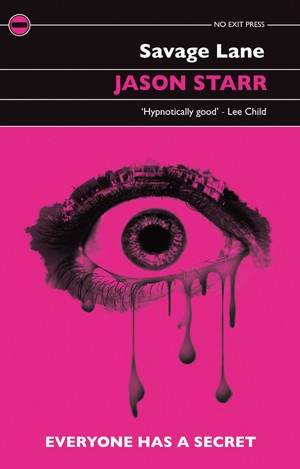
In Savage Lane, Jason Starr has brought his signature darkness to the domestic thriller genre with riveting and rib-tickling affect.
Karen Daily is a happy, well-adjusted divorcee living with her two kids in the idyllic New York City suburb of Westchester. Karen’s neighbour and close friend Mark Berman is not happy. He’s in a loveless marriage with his similarly unhappy wife Deb, but they’ve stayed together for the sake of their kids. As Mark’s dissatisfaction grows, so does his obsession with Karen. Convinced she secretly returns his affections, Mark’s fantasies of their future together become increasingly elaborate and severely deluded. And this is a key theme throughout Savage Lane – delusion.
The three leading men – Mark, Owen and detective Larry – are all convinced that their romantic interests return their infatuation. They are dangerously deluded. Not only does the author depict their infatuation with a scary, page-turning conviction, but it’s also a fantastic technique to build tension and suspense. When Mark’s reading through the text messages between himself and Karen, believing that she obviously feels the same and returns his love, it has you screaming at the pages, “No she doesn’t, you deranged sociopath!”
In the world of Savage Lane everyone has something to hide, from secondary characters like Mark’s golfing buddy Stu, who’s having an affair with Detective Larry, to Owen’s protective but weak mother – covering her son’s past crimes. One of Jason Starr’s strongest skills as a thriller writer is his ability to delve deep into his characters’ psyches and not only make them three dimensional and human but, in one way or another, highly relatable. We’ve all held an unrequited love for someone. We’ve all been in relationships that are happy and healthy on the outside but deteriorating behind closed doors. And we’ve all admired neighbours or friends from a far. This familiarity with the book’s tense situations and darkest themes, coupled with Starr’s knack for detail and the very natural flow of his narrative, subtly force us into the characters’ twisted hearts and warped minds, often without us even knowing it.
However, the writing’s strengths can also be its undoing. Starr’s narrative has a stream of consciousness quality to it, which, although highly organic and often enthralling, can sometimes seem like overkill. The constant bombardment of rhetorical questions is grating and these flowing narratives gushing off the page like elevators of blood threaten to dispel the pacing and burn out the great momentum that ramps up towards the end.
Like a well-dug grave, Starr delves deeply into his characters, exploring with abandon what makes them tick and exploiting their utter self-delusion to craft storylines that creep to the edges of humanity. Critics have drawn comparisons with Jim Thompson and James M Cain, and although these are warranted, Jason Starr’s prose isn’t as stripped back and brutal. It’s tough but with a wicked sense of humour and a boundless enthusiasm that may have even more impact if it was occasionally reigned in.
Jason Starr’s devilish wit and zealous style gives Savage Lane a unique sense of irreverence and some blackly hilarious moments, helping distinguish it in the busy thriller landscape.
Read our interview with Jason Starr here.
No Exit Press
Print/Kindle/iBook
£6.99
CFL Rating: 4 Stars









